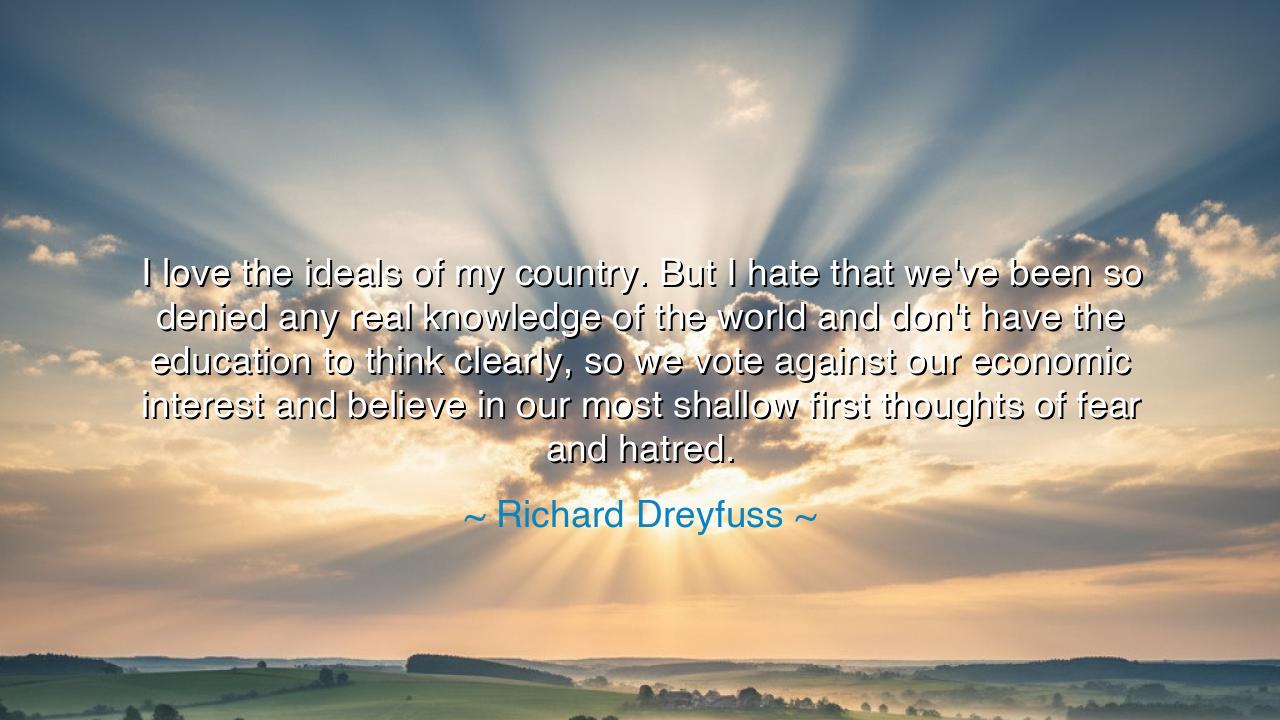
I love the ideals of my country. But I hate that we've been so
I love the ideals of my country. But I hate that we've been so denied any real knowledge of the world and don't have the education to think clearly, so we vote against our economic interest and believe in our most shallow first thoughts of fear and hatred.






In the words of Richard Dreyfuss: “I love the ideals of my country. But I hate that we’ve been so denied any real knowledge of the world and don’t have the education to think clearly, so we vote against our economic interest and believe in our most shallow first thoughts of fear and hatred.” These words strike like both a confession and a lament, a cry of devotion to what is noble and of anguish at what has been corrupted. For to love one’s nation is not to blind oneself to its faults—it is to speak truth with courage, to call it back to its higher path.
The ancients knew this paradox. In Athens, Pericles praised the democracy of his city, yet even as he extolled its ideals, voices like Socrates questioned whether the people were truly educated enough to govern wisely. Without the discipline of thought, they said, democracy becomes a ship without a rudder, tossed by passions of fear and hatred. Dreyfuss echoes this same ancient wisdom: that knowledge and education are the lifeblood of liberty, and without them, even the noblest system devours itself.
History offers us many warnings. In the early days of the French Revolution, the people rose with righteous fury against oppression, inspired by ideals of liberty, equality, and fraternity. Yet lacking experience and education in governance, their zeal was captured by demagogues. Soon, reason gave way to rage, and the fear of enemies, real and imagined, led to the Terror. What began as a pursuit of noble freedom fell into the abyss of hatred. Dreyfuss reminds us that when people are denied the tools to think clearly, they can be turned against their own interests, enslaved not by kings but by their own ignorance.
Yet his words also reveal hope: he does not despise his country, nor scorn its ideals. He loves them. He loves the vision of liberty, justice, and opportunity that forms the heart of the nation. What he despises is the betrayal of these ideals through neglect of education and the withholding of true knowledge of the wider world. For without these, people cannot distinguish between truth and falsehood, between leaders who uplift and those who manipulate. They become prey to the shallow whispers of fear, the easy promises of division, the poison of hatred.
Let us recall another story, that of Abraham Lincoln. Born into poverty, with little formal education, he taught himself through books, through reflection, through perseverance. His greatness did not come merely from his eloquence or ambition, but from his clarity of thought, forged by learning and reflection. In a time of division and hatred, he spoke to the higher ideals of the nation, reminding Americans of the promise embedded in their founding words. His example shows us that a people with knowledge and education can rise above the shallows of fear and act for their true interests.
The lesson is clear: if we love our country, we must demand not only prosperity and security, but also wisdom. We must invest in education that teaches not only facts, but the art of thinking clearly. We must seek knowledge of the world, lest we remain prisoners of narrow vision. And we must guard our hearts against the first impulses of fear and hatred, for though they are easy, they lead only to ruin. The strength of a nation lies not only in its armies or wealth, but in the clarity of mind and nobility of spirit of its people.
Therefore, O listener, take this truth into your soul: love of one’s country is empty if it is not joined with the pursuit of knowledge and the defense of truth. Do not settle for shallow thinking. Question, learn, reflect. Reject the easy path of fear and the bitter taste of hatred. Demand an education that prepares you not just to work, but to think. For only then will you truly serve your economic interest, your people, and the noble ideals that are the foundation of your nation. In this lies the highest form of patriotism—not blind loyalty, but enlightened devotion.






AAdministratorAdministrator
Welcome, honored guests. Please leave a comment, we will respond soon